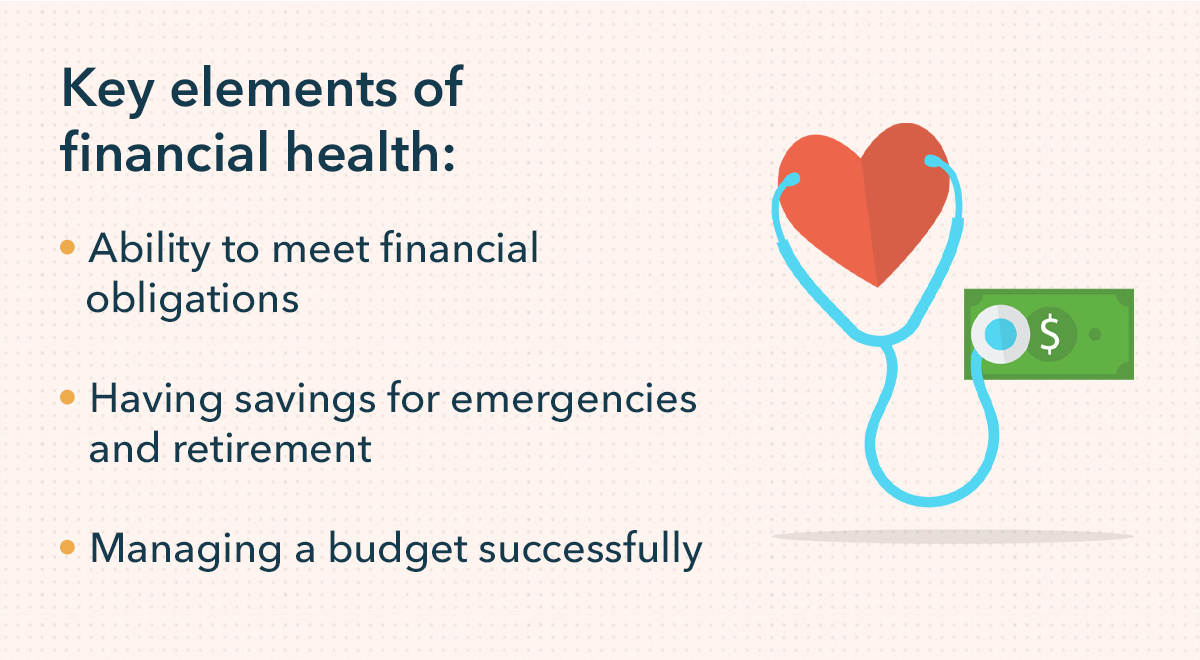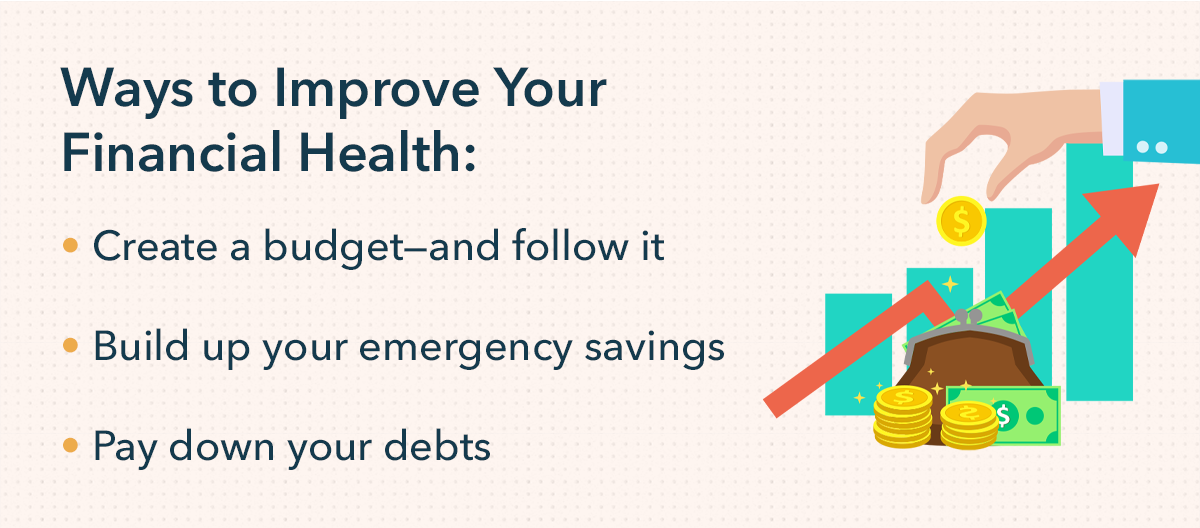Financial Health: Definition, Tips and Examples

Just like physical health, financial health is fundamental to a successful and happy life. Poor financial health — which includes being unable to pay your bills, having little or no savings, and being stuck with a low credit score — can significantly affect your quality of life.
Creating a good financial present not only helps in reducing the present stress but also ensures a secure and stable financial future. You need to be in good financial shape to literally lift your life in any way. Whether you want to rent an apartment, get a new car or buy a house. This does not only apply to your current situation, you need to be mindful of your financial health right now so that you can set yourself up for the best future.
So how do you do that? Don’t panic, in our guide we’ll define financial health, explain what you need to understand about your overall financial well-being, and how to improve it if you’re struggling. Use the links below to navigate the article to keep reading for a full overview of defined financial health.
What is Financial Health? financial health definition
You can define financial health in many ways because it is such a broad term. Generally speaking, financial health refers to the state of an individual’s monetary affairs, which includes:
- Are they able to meet their financial obligations
- How much is being saved as a retirement fund
- Are they financially prepared for emergencies
- How much is being spent on fixed or non-discretionary expenses
It not only covers all the activities related to your money management and how you plan for the future but it also shows the stability and status of your finances and financial affairs.

Strong financial health is indicated by the following factors:
- steady flow of income
- strong return on investment
- Rare change in expenses
- Savings balance rising
- good credit score rating
Financial experts have provided rough guidelines that serve as an indicator of financial health; However, each person’s situation is different. Therefore, it is important to develop your personal financial plan to ensure that you set yourself up to reach your goals and limit your risk of falling into financial rigors if the unexpected happens.
how to measure your financial health
There are many ways in which your financial health can be measured. Your total net worth and savings represent the monetary resources available at your disposal for future or present use.
These are the loans commonly affected, including credit card, student and auto loans, and refinancing a mortgage, Financial health is a constantly changing measurement of a person’s assets and liquidity, as well as based on fluctuations in the price of goods and services.

For example, a person’s salary may remain unchanged while the cost of food, college tuition, gasoline, and a mortgage may increase. Despite being in good financial condition initially, they may face financial problems if their income does not keep pace with the rising cost of goods due to inflation.

In order to have a better understanding of your financial health, the following key questions will make it easier for you to self-assess your financial health:
- Is your net worth positive or negative?
- How will you deal with any financial crisis? Do you have an emergency fund?
- Do you have everything you need in life? What about what you want?
- Have you set up a retirement corpus that will meet all your future needs? note that need retirement money differ from one person to another.
- Have You Designed a 401k Plan Keeping It 401k Contribution Limit in mind?
- Do you think you will be able to meet your long-term goals?
- Have you contributed to the Social Security Fund to enjoy social security benefits,
- What about insurance coverage? Do you have enough life and health insurance?
If you’re not ready to answer these questions, take a minute to look at your finances and see where you stand. Now is an equally good time to reevaluate your financial health and start planning when you need to take the next steps to improve it.

how to improve your financial health
Typically, we are guided by specific rules of thumb such as “you should put at least 10% of your income in your retirement fund” or “don’t buy a house with more than three years of income.”
And while these sayings are helpful and time-tested, it is necessary to consider various decisions that can help improve your financial health, depending on your current circumstances. Unfortunately, there is no one-size-fits-all advice, but there are guidelines.
First, you should calculate your net worth by taking a hard and realistic look at where you currently stand. Take everything you have in the account, including vehicles, retirement accounts and other assets, and deduct any and all debt. Now that you have that number, you can proceed by planning your next steps.
Create and follow a budget
The first and most important step in improving your financial health is to create a spending plan or personal budget. Created on an annual or monthly basis, a personal budget is an essential tool that helps you:
- reduce or eliminate expenses
- spend wisely
- save for future goals
- plan for emergency
- Prioritize saving and spending
Several approaches can be used when creating a budget; However, they are all involved in making estimates for expenses and income. These income and expense figures depend on your current financial situation and may change over time.
When budgeting, it is not enough to plan where you will be spending, but it is also important to check the areas where you are already spending. Do you have a recurring subscription you don’t need, such as cable? Are there any expenses you can deduct? Distinguishing between your ‘wants’ and ‘needs’ can be really accidental.
You can use mobile apps like Mint or spreadsheets to set a budget. Or go for the traditional and time-tested envelope method where you assign an envelope Place the allocated cash for each budget item such as groceries and in the respective envelope.
To maintain your financial health, sticking to your budget is essential as failure to do so can result in excessive expenses and huge debt. Even if you start making more money, it’s important to stick to your budget to protect yourself from “lifestyle creep,” where you spend more to earn more money.

create an emergency fund
An emergency fund refers to money set aside for emergency purposes. This fund is used to pay for things that would not normally be included in your personal budget, such as an emergency visit to the dentist or a car repair.
This fund also helps cover your ordinary expenses if your regular income becomes disrupted, for example, if you lose your job or an injury or illness prevents you from working. Although three to six months in your emergency fund is considered best for living expenses, unfortunately, this amount is usually not enough to cover a loss in income or a large expense.
Considering today’s uncertain economic conditions, you should aim to: Save at least six months’ worth of living expenses, if not more. Incorporating such unforeseen expenses as a regular expense in your budget helps to ensure that you are not squandering that money and saving it for emergencies.
Another thing to keep in mind is that setting up an emergency fund is an ongoing task. It is quite possible that as soon as you have a certain amount in the fund, there will be an expense that requires you to withdraw that amount. Instead of being disappointed, you should be glad you were financially prepared.

pay off debt
Use either the snowball or avalanche method to pay off your debt. The snowball method is where you pay off the smallest loan balance first and then save up to pay off the largest debt. On the other hand, the avalanche method is one where you pay as much as you can for the highest interest loan first and the lowest on all others.
Both these methods have their own advantages and disadvantages. Choose the one that suits you best, based on your money-handling preferences and debt load.
final notes
Keeping your financial health in tip-top shape can be quite a difficult task. This is true for those who have high paying jobs and even more so for individuals who are struggling to find work. Simply following finance rules may not be enough to achieve financial success, especially if you have vulnerable circumstances or find yourself in the latter category. To ensure excellent financial health, it is important to develop and create habits that allow you to make better financial choices and use all the tools at your disposal to help you stay on track.
By keeping the tips mentioned above in mind, you can ensure that your financial health is off to a good start. We also recommend using a money management app like MintWhich keeps track of all your financial information in one place.





